Can a horse eat watermelon – Can horses eat watermelon? The answer is yes, but with some important considerations. This juicy summer fruit offers a refreshing treat for horses, but it’s essential to understand its nutritional value and potential health concerns to ensure safe consumption.
Watermelon is packed with vitamins, minerals, and antioxidants that can benefit equine health. However, it’s also high in sugar, which can pose risks if consumed excessively. This guide will explore the nutritional benefits and potential drawbacks of watermelon for horses, providing clear guidelines for safe feeding practices.
Nutritional Value of Watermelon for Horses: Can A Horse Eat Watermelon
Watermelon is a refreshing and nutritious fruit that can be a healthy treat for horses. It is a good source of vitamins, minerals, antioxidants, and electrolytes, all of which are essential for equine health.
Horses may enjoy the occasional treat of watermelon, but it’s important to ensure it’s in moderation. While horses can consume watermelon, moderation is key. Cut watermelon, like any other fruit, has a limited shelf life. If you’re curious about how long cut watermelon remains edible, refer to this article . Returning to our equine friends, while watermelon can be a refreshing snack, it’s crucial to prioritize their regular diet of hay and grains.
Vitamins and Minerals
- Vitamin C: Watermelon is a good source of vitamin C, an antioxidant that helps protect cells from damage.
- Potassium: Watermelon is also a good source of potassium, an electrolyte that helps regulate fluid balance and muscle function.
- Magnesium: Watermelon contains magnesium, a mineral that is important for bone health and nerve function.
Antioxidants
Watermelon is a good source of antioxidants, which help protect cells from damage caused by free radicals. Free radicals are unstable molecules that can damage cells and contribute to the development of chronic diseases.
Electrolytes
Watermelon is a good source of electrolytes, which are minerals that help regulate fluid balance and muscle function. Electrolytes are lost through sweat, so watermelon can be a helpful way to replenish electrolytes after a workout or on a hot day.
Hydration
Watermelon is mostly water, so it can be a helpful way to keep horses hydrated. Dehydration can lead to a number of health problems, including colic, so it is important to make sure that horses have access to plenty of fresh water.
Horses can indulge in the sweet flesh of watermelon, quenching their thirst and providing a burst of vitamins. But what about their cloven-hoofed counterparts? Can goats , too, savor the juicy treat? As it turns out, they share the same fondness for this summer delight, relishing its hydrating and nutrient-rich properties.
Potential Health Concerns Associated with Watermelon Consumption

While watermelon offers numerous nutritional benefits, excessive consumption or improper feeding practices can pose potential health risks to horses. Understanding these concerns is crucial for ensuring the well-being of equine companions.
Excessive Sugar Intake, Can a horse eat watermelon
Watermelon is naturally high in sugar, primarily in the form of fructose. Excessive sugar intake can lead to dental issues, such as tooth decay and cavities, as bacteria thrive on the sugars and produce acids that erode tooth enamel. Additionally, high sugar levels can disrupt equine metabolism, potentially leading to weight gain, insulin resistance, and laminitis.
Digestive Issues
Feeding large amounts of watermelon or allowing horses to overindulge can result in digestive problems. The high water content and fiber in watermelon can cause colic, a painful abdominal condition. Diarrhea is another potential issue, particularly in horses with sensitive digestive systems. To minimize these risks, it is essential to introduce watermelon gradually and offer it in moderation as an occasional treat.
Appropriate Portion Sizes
To prevent potential health concerns, it is crucial to adhere to appropriate portion sizes when feeding watermelon to horses. As a general guideline, a horse can safely consume up to 2-3 slices of watermelon per day, depending on their size and overall diet. It is always advisable to consult with a veterinarian for personalized recommendations based on the individual horse’s health and dietary needs.
Safe Feeding Practices for Watermelon
To ensure the safe consumption of watermelon for horses, it is crucial to follow proper feeding practices. These guidelines help minimize potential risks and maximize the nutritional benefits of this treat.
In the verdant pastures where horses graze, a question arises: can these majestic creatures indulge in the sweet succulence of watermelon? As we delve into this inquiry, we encounter a tangential enigma: is watermelon a vegetable? Botanical taxonomists would argue otherwise, classifying it as a fruit.
Nonetheless, its nutritional profile and culinary versatility have led many to consider it a vegetable. Returning to our initial query, while horses can indeed savor the juicy flesh of watermelon, moderation is key. Its high sugar content can pose digestive challenges if consumed in excess.
The recommended portion size of watermelon for horses varies depending on their size, age, and health status. As a general rule, a small horse (under 1,000 pounds) can safely consume up to 2-3 pounds of watermelon per day, while larger horses (over 1,000 pounds) can have up to 4-6 pounds per day.
As the sun dipped behind the horizon, casting an ethereal glow upon the sprawling meadow, a curious question arose in my mind: can a horse indulge in the sweet delight of watermelon? The answer, my friends, lies in the delicate balance of equine digestion.
While horses can indeed savor this juicy treat, their intake must be carefully monitored to avoid digestive upset. But what about our feathered friends? Can chickens partake in this summery indulgence? Discover the answer by delving into the fascinating realm of poultry nutrition: can chickens eat watermelon .
Frequency of feeding should also be considered. Watermelon should be offered as an occasional treat, not a regular part of the horse’s diet. Limit watermelon consumption to once or twice a week to prevent digestive issues.
Before feeding watermelon to horses, it is essential to remove the seeds and rind. Seeds can cause intestinal blockage, while the rind contains a substance called cucurbitacin, which can be toxic to horses in large quantities.
The vibrant sweetness of watermelon is not just a treat for humans. Horses, too, can indulge in this summer delight. But when is the optimal time to harvest watermelon for both human and equine enjoyment? Harvesting watermelon at its peak ensures the perfect balance of sweetness and juiciness, a treat that your horse will savor as much as you do.
Removing Seeds and Rind
- Thoroughly wash the watermelon and cut it in half.
- Use a spoon to scoop out the seeds and discard them.
- Cut the watermelon into bite-sized pieces, removing the rind as you go.
- Offer the seedless, rindless watermelon pieces to your horse.
Alternative Fruit Options for Horses

Watermelon, while a nutritious treat, is not the only fruit that can provide health benefits to horses. Other commonly fed fruits, such as apples, carrots, and bananas, offer unique nutritional profiles and can contribute to a balanced equine diet.
Nutritional Comparison
The following table compares the nutritional value of watermelon to apples, carrots, and bananas:
| Fruit | Calories | Carbohydrates (g) | Sugar (g) | Fiber (g) | Vitamin C (mg) | Potassium (mg) |
|---|---|---|---|---|---|---|
| Watermelon | 46 | 11 | 9 | 0.4 | 12 | 110 |
| Apple | 52 | 14 | 10 | 2.4 | 14 | 107 |
| Carrot | 25 | 6 | 5 | 2.8 | 8 | 200 |
| Banana | 89 | 23 | 17 | 3.1 | 10 | 422 |
Unique Benefits and Drawbacks
Each fruit offers its own unique benefits and drawbacks:
- Watermelon: High in water content, low in calories, good source of electrolytes and antioxidants.
- Apples: Good source of pectin, which can aid in digestion. High in sugar, so should be fed in moderation.
- Carrots: Rich in beta-carotene, which is converted to vitamin A. Can be high in oxalates, which can be harmful in large quantities.
- Bananas: High in potassium, which is essential for muscle function. High in sugar and calories, so should be fed sparingly.
Safe Feeding Practices
When feeding fruits to horses, it is important to follow safe feeding practices:
- Wash fruits thoroughly to remove any dirt or pesticides.
- Cut fruits into small pieces to prevent choking.
- Feed fruits as a treat, not as a staple part of the diet.
- Monitor horses for any signs of digestive upset, such as colic or diarrhea.
End of Discussion

In conclusion, watermelon can be a healthy and enjoyable treat for horses when fed in moderation. By following the recommended guidelines for portion size, frequency, and preparation, horse owners can safely incorporate this refreshing fruit into their equine’s diet. Remember to consult with a veterinarian for personalized advice based on the individual horse’s health and dietary needs.
FAQ Summary
How much watermelon can I feed my horse?
The recommended portion size for horses is 1-2 cups of watermelon per day, depending on their size and health status.
Can horses eat watermelon rind?
No, watermelon rind should not be fed to horses as it can be difficult to digest and may cause digestive issues.
Can horses eat watermelon seeds?
While watermelon seeds are not toxic to horses, they can be a choking hazard and should be removed before feeding.

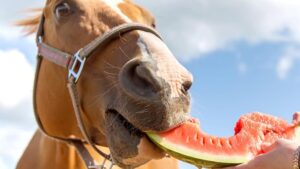

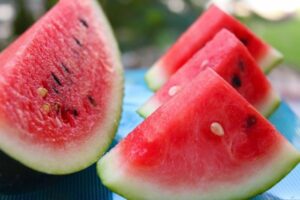
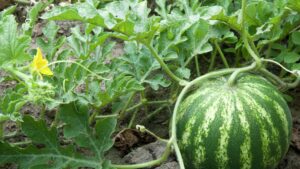
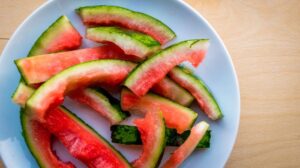
Leave a Comment